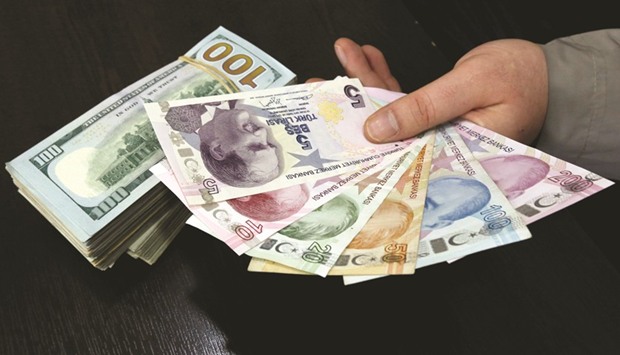Turks aren’t as optimistic about the lira’s post-referendum potential as global banks including Deutsche Bank.
Quite the opposite, in fact.
As the currency gained in the days after citizens voted to give President Recep Tayyip Erdogan sweeping powers on April 16, individuals and businesses were selling it, according to bankers with knowledge of flows. Their preliminary estimates show locals purchased a net $1.5bn to $2bn of foreign currencies last week.
Since Turks keep about 40% of their 1.48tn liras ($411bn) of deposits in currencies like the dollar and euro, what they do with those savings can have a meaningful impact on the currency’s trajectory. If they keep shunning the lira, that risks undermining gains projected by analysts at Deutsche Bank, Credit Suisse Group and others.
The political situation is likely to “continue to constrain the currency,” said Manik Narain, a London-based strategist at UBS AG, citing Turkey’s deteriorating relations with the European Union among reasons local investors are cautious.
The referendum result was a relief for many money managers. While it gave Erdogan a popular mandate to consolidate power, the narrowness of the victory means he’s unlikely to hold an early election to speed up the transfer of power to his office.
After strengthening as much as 2.5% in the hours after the referendum result, the lira ended the week 1.8% higher at 3.6438 per dollar.
The lira “is potentially the next currency that investors use to take advantage of the relatively carry-friendly environment,” Deutsche Bank’s London-based strategist Gautam Kalani said in his note. No exchange rate other than the Argentine peso has a higher one-year forward implied yield.
This isn’t the first time investors in Turkey are managing their cash in a way that defies the broader trend. As the lira tumbled last year, especially around the time of the failed coup attempt against Erdogan in the summer, they drew down their dollar and euro holdings. That helped cushion the depreciation.
This year, they pursued the opposite strategy: As the central bank elevated borrowing costs to stabilise the lira after it tumbled to an unprecedented low of 3.9415 per dollar in January, domestic investors steadily built their dollar and euro positions again, which had fallen to an almost two-year low.
Foreign-currency purchases since the vote, if confirmed by official data, would mark a continuation of a trend that saw locals buy $2.73bn in the week before the referendum and $9.4bn this year.
Narain, at UBS, said one reason Turks are selling liras is that interest rates on deposits, while climbing, are “modest” when inflation is taken into account. The weighted average rate on local-currency deposits of three months or less is 11.49%, according to central bank data, barely compensating Turks for annual inflation at a nine-year high of 11.29%.
Central Bank Governor Murat Cetinkaya last week reiterated his pledge to keep monetary policy tight. The next interest rate decision is tomorrow.
“Any signal they are looking at the end of the cycle would make it hard to spin a positive narrative for the currency,” said Narain, who predicts the lira will fall to 4 per dollar by year-end.

A money changer holds Turkish lira banknotes next to US dollar bills at a currency exchange office in central Istanbul. Since Turks keep about 40% of their 1.48tn liras ($411bn) of deposits in currencies like the dollar and euro, what they do with those savings can have a meaningful impact on the currency’s trajectory.
